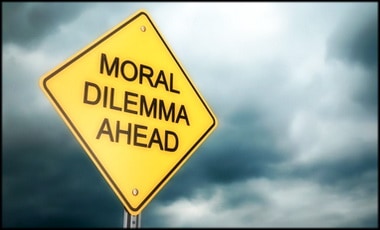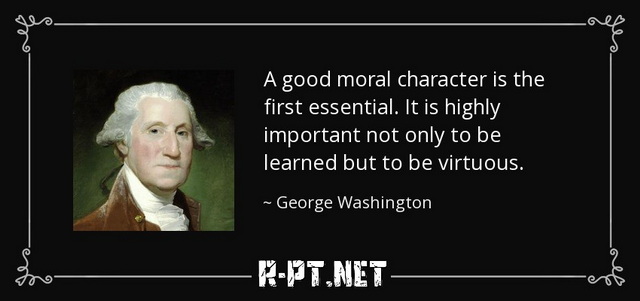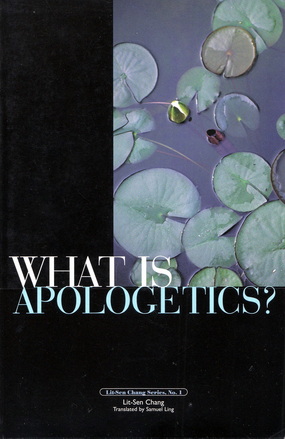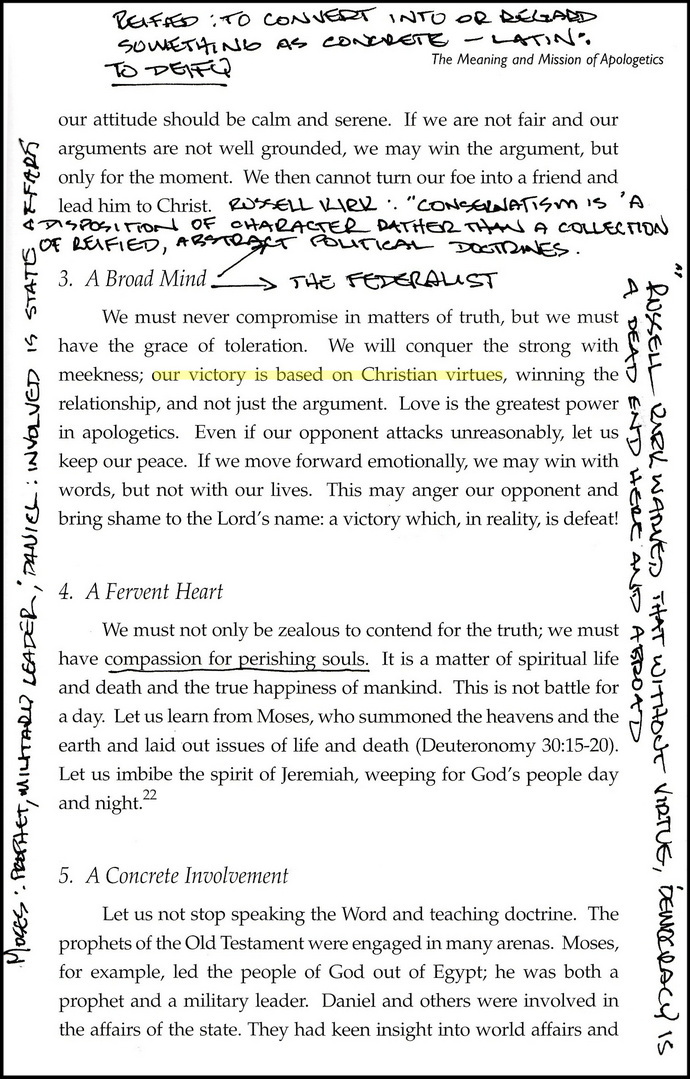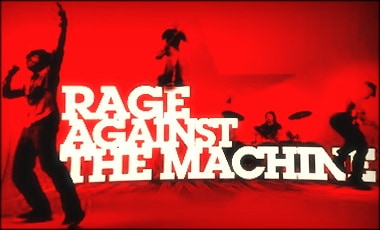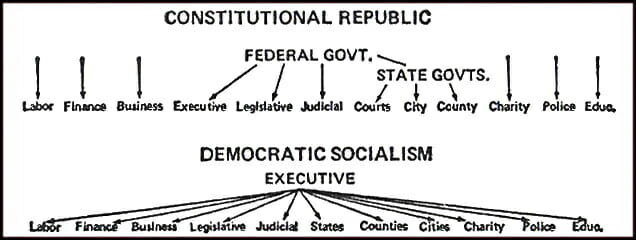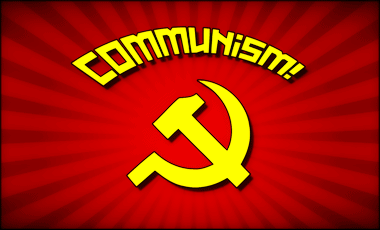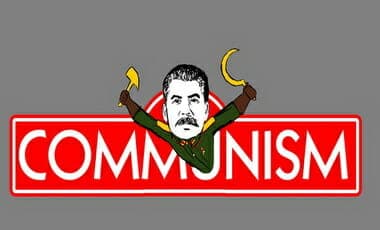If you are looking for a quick
read, this is not it
hit back on your browser
and exit… be forewarned.
INTRO
What lies below are three excerpts from articles I wish to highlight. There is much more below, but after reding The Washington Times article and the Monbattery post, this addition to my website was birthed.
I will end with Moonbat discussing the kid from the Air Force who lit himself on fire in front of the Israeli embassy as a night-cap discussing our current military condition in regard to DEI, CRT, and WOKE ideology.
Also below is a 12-page excerpt of Richard Weaver’s book, IDEAS HAVE CONSEQUENCES… a large chunk of his introduction. (INTERNET ARCHIVE has the entire 1948 edition for free.) The below is — I think — a good explainer for the phenomenon we are seeing, and if this culture continues, we will see more of.
HERITAGE FOUNDATION
Since the beginning of the Biden administration how the #WOKE/DEI agenda has been implemented in the military. Heritage Foundation notes this in a 2023 article:
The U.S. Armed Forces have one mission: to protect our nation from foreign enemies. Our troops are as committed to that mission as ever before. But according to a bracing new report, our warriors’ ability to do their job is being undermined by civilian leaders more interested in woke indoctrination and partisan politics than warfighting readiness.
“The Report of the National Independent Panel on Military Service and Readiness” is an urgent warning about creeping politicization at the Pentagon and its corrosive impact on America’s national defense. As the report details, the Biden administration’s whole-of-government embrace of woke politics is becoming a dangerous distraction for servicemen and women who signed up to protect and defend, not virtue-signal.
The top-line statistics compiled in the report are jarring.
Last year, the Army missed its recruiting goal by 25 percent. They expect this year to be even worse. The Navy, Air Force and Marine Corps began the new fiscal year in October 50 percent below their normal recruiting numbers. Public confidence in the military is falling precipitously, and even military families—from which most recruits come—are less likely to recommend military life.
What explains the decline? According to a November poll, the most common explanations included “military leadership becoming overly politicized” and “so-called ‘woke’ practices undermining military effectiveness.” Another survey found that 65 percent of active-duty servicemen and women are concerned about politicization, including the woke training programs and equity-minded reduced physical fitness standards.
Troop retention rates are falling, too, and for the same reasons. As the report notes, “the perception that non-warfighting missions are distracting senior military leadership may alienate experienced, skilled and knowledgeable warfighters, incentivizing their early departure[.]” ….
For those that need some further confirmation… this is not good. And while there are two more articles to follow, here is a very long quote from an introduction to a book I read in the late 90’s — itself written in 1948, that goes a long way to explain the rotting roots of our current fruit.
- “Ideas have consequences, and totally erroneous ideas are likely to have destructive consequences.” — Steve Allen
Like I said, this is not a short/pithy post:
RICHARD WEAVER
INTERNET ARCHIVE has the entire 1948 edition for free. – PDF of below:
INTRODUCTION
This is another book about the dissolution of the West. I attempt two things not commonly found in the growing literature of this subject. First, I present an account of that decline based not on analogy but on deduction. It is here the assumption that the world is intelligible and that man is free and that those consequences we are now expiating are the product not of biological or other necessity but of unintelligent choice. Second, I go so far as to propound, if not a whole solution, at least the beginning of one, in the belief that man should not follow a scientific analysis with a plea of moral impotence.
In considering the world to which these matters are addressed, I have been chiefly impressed by the difficulty of getting certain initial facts admitted. This difficulty is due in part to the widely prevailing Whig theory of history, with its belief that the most advanced point in time represents the point of highest development, aided no doubt by theories of evolution which suggest to the uncritical a kind of necessary passage from simple to complex. Yet the real trouble is found to lie deeper than this. It is the appalling problem, when one comes to actual cases, of getting men to distinguish between better and worse. Are people today provided with a sufficiently rational scale of values to attach these predicates with intelligence? There is ground for declaring that modern man has become a moral idiot. So few are those who care to examine their lives, or to accept the rebuke which comes of admitting that our present state may be a fallen state, that one questions whether people now understand what is meant by the superiority of an ideal. One might expect abstract reasoning to be lost upon them; but what is he to think when attestations of the most concrete kind are set before them, and they are still powerless to mark a difference or to draw a lesson? For four centuries every man has been not only his own priest but his own professor of ethics, and the consequence is an anarchy which threatens even that minimum consensus of value necessary to the political state.
Surely we are justified in saying of our time: If you seek the monument to our folly, look about you. In our own day we have seen cities obliterated and ancient faiths stricken. We may well ask, in the words of Matthew, whether we are not faced with “great tribulation, such as was not since the beginning of the world.” We have for many years moved with a brash confidence that man had achieved a position of independence which rendered the ancient restraints needless. Now, in the first half of the twentieth century, at the height of modern progress, we behold unprecedented outbreaks of hatred and violence; we have seen whole nations desolated by war and turned into penal camps by their conquerors; we find half of mankind looking upon the other half as criminal. Everywhere occur symptoms of mass psychosis. Most portentous of all, there appear diverging bases of value, so that our single planetary globe is mocked by worlds of different understanding. These signs of disintegration arouse fear, and fear leads to desperate unilateral efforts toward survival, which only forward the process.
Like Macbeth, Western man made an evil decision, which has become the efficient and final cause of other evil decisions. Have we forgotten our encounter with the witches on the heath? It occurred in the late fourteenth century, and what the witches said to the protagonist of this drama was that man could realize himself more fully if he would only abandon his belief in the existence of transcendentals. The powers of darkness were working subtly, as always, and they couched this proposition in the seemingly innocent form of an attack upon universals. The defeat of logical realism in the great medieval debate was the crucial event in the history of Western culture; from this flowed those acts which issue now in modern decadence.
One may be accused here of oversimplifying the historical process, but I take the view that the conscious policies of men and governments are not mere rationalizations of what has been brought about by unaccountable forces. They are rather deductions from our most basic ideas of human destiny, and they have a great, though not unobstructed, power to determine our course.
For this reason I turn to William of Occam as the best representative of a change which came over man’s conception of reality at this historic juncture. It was William of Occam who propounded the fateful doctrine of nominalism, which denies that universals have a real existence. His triumph tended to leave universal terms mere names serving our convenience. The issue ultimately involved is whether there is a source of truth higher than, and independent of, man; and the answer to the question is decisive for one’s view of the nature and destiny of humankind. The practical result of nominalist philosophy is to banish the reality which is perceived by the intellect and to posit as reality that which is perceived by the senses. With this change in the affirmation of what is real, the whole orientation of culture takes a turn, and we are on the road to modern empiricism.
It is easy to be blind to the significance of a change because it is remote in time and abstract in character. Those who have not discovered that world view is the most important thing about a man, as about the men composing a culture, should consider the train of circumstances which have with perfect logic proceeded from this. The denial of universals carries with it the denial of everything transcending experience. The denial of everything transcending experience means inevitably—though ways are found to hedge on this—the denial of truth. With the denial of objective truth there is no escape from the relativism of “man the measure of all things.” The witches spoke with the habitual equivocation of oracles when they told man that by this easy choice he might realize himself more fully, for they were actually initiating a course which cuts one off from reality. Thus began the “abomination of desolation” appearing today as a feeling of alienation from all fixed truth.
Because a change of belief so profound eventually influences every concept, there emerged before long a new doctrine of nature. Whereas nature had formerly been regarded as imitating a transcendent model and as constituting an imperfect reality, it was henceforth looked upon as containing the principles of its own constitution and behavior. Such revision has had two important consequences for philosophical inquiry. First, it encouraged a careful study of nature, which has come to be known as science, on the supposition that by her acts she revealed her essence. Second, and by the same operation, it did away with the doctrine of forms imperfectly realized. Aristotle had recognized an element of unintelligibility in the world, but the view of nature as a rational mechanism expelled this element. The expulsion of the element of unintelligibility in nature was followed by the abandonment of the doctrine of original sin. If physical nature is the totality and if man is of nature, it is impossible to think of him as suffering from constitutional evil; his defections must now be attributed to his simple ignorance or to some kind of social deprivation. One comes thus by clear deduction to the corollary of the natural goodness of man.
And the end is not yet. If nature is a self-operating mechanism and man is a rational animal adequate to his needs, it is next in order to elevate rationalism to the rank of a philosophy. Since man proposed now not to go beyond the world, it was proper that he should regard as his highest intellectual vocation methods of interpreting data supplied by the senses. There followed the transition to Hobbes and Locke and the eighteenth-century rationalists, who taught that man needed only to reason correctly upon evidence from nature. The question of what the world was made for now becomes meaningless because the asking of it presupposes something prior to nature in the order of existents. Thus it is not the mysterious fact of the world’s existence which interests the new man but explanations of how the world works. This is the rational basis for modern science, whose systemization of phenomena is, as Bacon declared in the New Atlantis, a means to dominion.
At this stage religion begins to assume an ambiguous dignity, and the question of whether it can endure at all in a world of rationalism and science has to be faced. One solution was deism, which makes God the outcome of a rational reading of nature. But this religion, like all those which deny antecedent truth, was powerless to bind; it merely left each man to make what he could of the world open to the senses. There followed references to “nature and nature’s God,” and the anomaly of a “humanized” religion.
Materialism loomed next on the horizon, for it was implicit in what had already been framed. Thus it soon became imperative to explain man by his environment, which was the work of Darwin and others in the nineteenth century (it is further significant of the pervasive character of these changes that several other students were arriving at similar explanations when Darwin published in 1859). If man came into this century trailing clouds of transcendental glory, he was now accounted for in a way that would satisfy the positivists.
With the human being thus firmly ensconced in nature, it at once became necessary to question the fundamental character of his motivation. Biological necessity, issuing in the survival of the fittest, was offered as the causa causans, after the important question of human origin had been decided in favor of scientific materialism.
After it has been granted that man is molded entirely by environmental pressures, one is obligated to extend the same theory of causality to his institutions. The social philosophers of the nineteenth century found in Darwin powerful support for their thesis that human beings act always out of economic incentives, and it was they who completed the abolishment of freedom of the will. The great pageant of history thus became reducible to the economic endeavors of individuals and classes; and elaborate prognoses were constructed on the theory of economic conflict and resolution. Man created in the divine image, the protagonist of a great drama in which his soul was at stake, was replaced by man the wealth-seeking and-consuming animal.
Finally came psychological behaviorism, which denied not only freedom of the will but even such elementary means of direction as instinct. Because the scandalous nature of this theory is quickly apparent, it failed to win converts in such numbers as the others; yet it is only a logical extension of them and should in fairness be embraced by the upholders of material causation. Essentially, it is a reduction to absurdity of the line of reasoning which began when man bade a cheerful goodbye to the concept of transcendence.
There is no term proper to describe the condition in which he is now left unless it be “abysmality.” He is in the deep and dark abysm, and he has nothing with which to raise himself. His life is practice without theory. As problems crowd upon him, he deepens confusion by meeting them with ad hoc policies. Secretly he hungers for truth but consoles himself with the thought that life should be experimental. He sees his institutions crumbling and rationalizes with talk of emancipation. Wars have to be fought, seemingly with increased frequency; therefore he revives the old ideals—ideals which his present assumptions actually render meaningless—and, by the machinery of state, forces them again to do service. He struggles with the paradox that total immersion in matter unfits him to deal with the problems of matter.
His decline can be represented as a long series of abdications. He has found less and less ground for authority at the same time he thought he was setting himself up as the center of authority in the universe; indeed, there seems to exist here a dialectic process which takes away his power in proportion as he demonstrates that his independence entitles him to power.
This story is eloquently reflected in changes that have come over education. The shift from the truth of the intellect to the facts of experience followed hard upon the meeting with the witches. A little sign appears, “a cloud no bigger than a man’s hand,” in a change that came over the study of logic in the fourteenth century—the century of Occam. Logic became grammaticized, passing from a science which taught men vere loqui to one which taught recte loqui or from an ontological division by categories to a study of signification, with the inevitable focus upon historical meanings. Here begins the assault upon definition: if words no longer correspond to objective realities, it seems no great wrong to take liberties with words. From this point on, faith in language as a means of arriving at truth weakens, until our own age, filled with an acute sense of doubt, looks for a remedy in the new science of semantics.
So with the subject matter of education. The Renaissance increasingly adapted its course of study to produce a successful man of the world, though it did not leave him without philosophy and the graces, for it was still, by heritage, at least, an ideational world and was therefore near enough transcendental conceptions to perceive the dehumanizing effects of specialization. In the seventeenth century physical discovery paved the way for the incorporation of the sciences, although it was not until the nineteenth that these began to challenge the very continuance of the ancient intellectual disciplines. And in this period the change gained momentum, aided by two developments of overwhelming influence. The first was a patent increase in man’s dominion over nature which dazzled all but the most thoughtful; and the second was the growing mandate for popular education. The latter might have proved a good in itself, but it was wrecked on equalitarian democracy’s unsolvable problem of authority: none was in a position to say what the hungering multitudes were to be fed. Finally, in an abject surrender to the situation, in an abdication of the authority of knowledge, came the elective system. This was followed by a carnival of specialism, professionalism, and vocationalism, often fostered and protected by strange bureaucratic devices, so that on the honored name of university there traded a weird congeries of interests, not a few of which were anti-intellectual even in their pretensions. Institutions of learning did not check but rather contributed to the decline by losing interest in Homo sapiens to develop Homo faber.
Studies pass into habits, and it is easy to see these changes reflected in the dominant type of leader from epoch to epoch. In the seventeenth century it was, on the one side, the royalist and learned defender of the faith and, on the other, aristocratic intellectuals of the type of John Milton and the Puritan theocrats who settled New England. The next century saw the domination of the Whigs in England and the rise of encyclopedists and romanticists on the Continent, men who were not without intellectual background but who assiduously cut the mooring strings to reality as they succumbed to the delusion that man is by nature good. Frederick the Great’s rebuke to a sentimentalist, “Ach, mehn lheber Sulzer, er kennt nhcht dhese verdammte Rasse,” epitomizes the difference between the two outlooks. The next period witnessed the rise of the popular leader and demagogue, the typical foe of privilege, who broadened the franchise in England, wrought revolution on the Continent, and in the United States replaced the social order which the Founding Fathers had contemplated with demagogism and the urban political machine. The twentieth century ushered in the leader of the masses, though at this point there occurs a split whose deep significance we shall have occasion to note. The new prophets of reform divide sharply into sentimental humanitarians and an elite group of remorseless theorists who pride themselves on their freedom from sentimentality. Hating this world they never made, after its debauchery of centuries, the modern Communists— revolutionaries and logicians—move toward intellectual rigor. In their decision lies the sharpest reproach yet to the desertion of intellect by Renaissance man and his successors. Nothing is more disturbing to modern men of the West than the logical clarity with which the Communists face all problems. Who shall say that this feeling is not born of a deep apprehension that here are the first true realists in hundreds of years and that no dodging about in the excluded middle will save Western liberalism?
This story of man’s passage from religious or philosophical transcendentalism has been told many times, and, since it has usually been told as a story of progress, it is extremely difficult today to get people in any number to see contrary implications. Yet to establish the fact of decadence is the most pressing duty of our time because, until we have demonstrated that cultural decline is a historical fact—which can be established—and that modern man has about squandered his estate, we cannot combat those who have fallen prey to hysterical optimism.
Such is the task, and our most serious obstacle is that people traveling this downward path develop an insensibility which increases with their degradation. Loss is perceived most clearly at the beginning; after habit becomes implanted, one beholds the anomalous situation of apathy mounting as the moral crisis deepens. It is when the first faint warnings come that one has the best chance to save himself; and this, I suspect, explains why medieval thinkers were extremely agitated over questions which seem to us today without point or relevance. If one goes on, the monitory voices fade out, and it is not impossible for him to reach a state in which his entire moral orientation is lost. Thus in the face of the enormous brutality of our age we seem unable to make appropriate response to perversions of truth and acts of bestiality. Multiplying instances show complacency in the presence of contradiction which denies the heritage of Greece, and a callousness to suffering which denies the spirit of Christianity. Particularly since the great wars do we observe this insentience. We approach a condition in which we shall be amoral without the capacity to perceive it and degraded without means to measure our descent.
That is why, when we reflect upon the cataclysms of the age, we are chiefly impressed with the failure of men to rise to the challenge of them. In the past, great calamities have called forth, if not great virtues, at least heroic postures; but after the awful judgments pronounced against men and nations in recent decades, we detect notes of triviality and travesty. A strange disparity has developed between the drama of these actions and the conduct of the protagonists, and we have the feeling of watching actors who do not comprehend their roles.
Hysterical optimism will prevail until the world again admits the existence of tragedy, and it cannot admit the existence of tragedy until it again distinguishes between good and evil. Hope of restoration depends upon recovery of the “ceremony of innocence,” of that clearness of vision and knowledge of form which enable us to sense what is alien or destructive, what does not comport with our moral ambition. The time to seek this is now, before we have acquired the perfect insouciance of those who prefer perdition. For, as the course goes on, the movement turns centrifugal; we rejoice in our abandon and are never so full of the sense of accomplishment as when we have struck some bulwark of our culture a deadly blow.
In view of these circumstances, it is no matter for surprise that, when we ask people even to consider the possibility of decadence, we meet incredulity and resentment. We must consider that we are in effect asking for a confession of guilt and an acceptance of sterner obligation; we are making demands in the name of the ideal or the suprapersonal, and we cannot expect a more cordial welcome than disturbers of complacency have received in any other age. On the contrary, our welcome will rather be less today, for a century and a half of bourgeois ascendancy has produced a type of mind highly unreceptive to unsettling thoughts. Added to this is the egotism of modern man, fed by many springs, which will scarcely permit the humility needed for self-criticism.
The apostles of modernism usually begin their retort with catalogues of modern achievement, not realizing that here they bear witness to their immersion in particulars. We must remind them that we cannot begin to enumerate until we have defined what is to be sought or proved. It will not suffice to point out the inventions and processes of our century unless it can be shown that they are something other than a splendid efflorescence of decay. Whoever desires to praise some modern achievement should wait until he has related it to the professed aims of our civilization as rigorously as the Schoolmen related a corollary to their doctrine of the nature of God. All demonstrations lacking this are pointless.
If it can be agreed, however, that we are to talk about ends before means, we may begin by asking some perfectly commonplace questions about the condition of modern man. Let us, first of all, inquire whether he knows more or is, on the whole, wiser than his predecessors.
This is a weighty consideration, and if the claim of the modern to know more is correct, our criticism falls to the ground, for it is hardly to be imagined that a people who have been gaining in knowledge over the centuries have chosen an evil course.
Naturally everything depends on what we mean by knowledge. I shall adhere to the classic proposition that there is no knowledge at the level of sensation, that therefore knowledge is of universals, and that whatever we know as a truth enables us to predict. The process of learning involves interpretation, and the fewer particulars we require in order to arrive at our generalization, the more apt pupils we are in the school of wisdom.
The whole tendency of modern thought, one might say its whole moral impulse, is to keep the individual busy with endless induction. Since the time of Bacon the world has been running away from, rather than toward, first principles, so that, on the verbal level, we see “fact” substituted for “truth,” and on the philosophic level, we witness attack upon abstract ideas and speculative inquiry. The unexpressed assumption of empiricism is that experience will tell us what we are experiencing. In the popular arena one can tell from certain newspaper columns and radio programs that the average man has become imbued with this notion and imagines that an industrious acquisition of particulars will render him a man of knowledge. With what pathetic trust does he recite his facts! He has been told that knowledge is power, and knowledge consists of a great many small things.
Thus the shift from speculative inquiry to investigation of experience has left modern man so swamped with multiplicities that he no longer sees his way. By this we understand Goethe’s dictum that one may be said to know much only in the sense that he knows little. If our contemporary belongs to a profession, he may be able to describe some tiny bit of the world with minute fidelity, but still he lacks understanding. There can be no truth under a program of separate sciences, and his thinking will be invalidated as soon as ab extra relationships are introduced.
The world of “modern” knowledge is like the universe of Eddington, expanding by diffusion until it approaches the point of nullity….
Wow, wow, wow. Think of the movement on the Left to say, as one example, that men can give birth and menstruate. Weaver was prophetic in his noting how bad this zeitgeist was going to get.
Okay, pivoting BACK TO our military and consequences of ideas that harm it’s readiness and the type of young people applying. What I mean when I say that is that the young officer class have typically one through university and many have accepted the CRT/WOKE/DEI junk — what Weaver would call “hysterical optimism.”
WASHINGTON TIMES
Here is the WaTi article excerpt:
Recently, Ashish Vazirani, the Pentagon‘s acting undersecretary for personnel and readiness, testified to the House Armed Services Committee that the U.S. military missed its 2023 recruiting goals by 41,000.
Jake Bequette, an Army veteran and former U.S. Senate candidate from Arkansas, responded to this report by suggesting that no one should be surprised. Why? Because of what we’re teaching in our nation’s schools.
“In our education system today, so few young people are hearing real history,” Mr. Bequette said. “They’re hearing our American heroes being represented as evil racists … who were doing all these terrible things to disadvantaged people. And that really is shaping the views of America’s youth and making them have less respect for our institutions, have less respect for our history, and therefore making them less liable to want to put their lives potentially on the line to serve in our country’s military.”
Unless you’ve been sleeping through the past three or more decades, it’s virtually impossible for you to disagree with Mr. Bequette. Consider just a handful of examples of the intellectual malfeasance being foisted on the next generation of America’s leaders at your tax-supported schools, colleges and universities.
At the University of Minnesota, a liberal arts professor named Melanie Yazzie has received national attention for leading a “teach-in” whereby she calls for her students to “dismantle” and “decolonize” America.
“We’re all indigenous people who come from nations who are under occupation by the United States government,” Ms. Yazzie said. “It’s our responsibility as people within the United States … to decolonize this place. … [America] is the greatest predator empire that has ever existed. We want the U.S. out of everywhere,” including “Turtle Island” — a name used by some Native American tribes to describe North America.
She went on to say that “the goal is to dismantle the settler project that is the United States for the freedom and the future of all life on this planet. [We] need to lean into the fact that colonizers are scared. Lean into scaring them and making them feel uncomfortable!”
In Milwaukee, the public school system is touting “classroom resources for all ages” to support a curriculum called “Black Lives Matter at School Week of Action.” A search of this organization’s website reveals the program’s 13 guiding principles. They include “Restorative Justice,” “Globalism,” “Queer Affirming” and “Transgender Affirming” as their primary goals.
The 11th principle, “Black Villages,” states: “We disrupt the narrow Western prescribed nuclear family structure. … We support each other as extended families and villages that collectively care for one another, especially ‘our’ children.”
Tina Descovich, co-founder of Moms for Liberty, says it best in response to this BLM agenda:
“We are in a crisis in America in public education. We have the lowest test scores since the 1980s in reading and the lowest math scores ever. Yet we have organizations like Black Lives Matter that are setting aside a whole, entire week, the first week of February, to drive their ideology, [an ideology] that [is] divisive and [seeks] to destroy our culture and our country,” she said.
Ms. Descovich goes on to suggest that nearly all of our nation’s schools are pushing this divisive material as “a cover-up for public education’s failure.”
Do you remember in 2020, when rioters from Minneapolis to Miami were chanting, “Death to Israel, death to America, from Gaza to Minnesota, globalize the intifada”? There’s a reason that thousands of young people marched like lemmings to the drumbeat of such blatant and undisguised antisemitism, anti-Americanism and anti-colonialism. That reason is found in what the schools, colleges and universities are teaching your children.
Call me crazy, but maybe the U.S. military is falling short of its recruiting goals by the tens of thousands because of the culturally suicidal propaganda being peddled by our country’s teachers unions and educational elites.
When you indoctrinate one generation after another that America needs to be “dismantled” and “decolonized,” why would you think those same young people would want to make the ultimate sacrifice to defend it? ……
Which brings us to the most recent example of a person filled with lies, and it’s consequences in his life.
Aaron Bushnell’s LEFTISM
Now, this person was left leaning already, but I am sure his higher ed institution pushed him even further. What do I mean? The NEW YORK POST mentions he was attending Southern New Hampshire University. Here is the skinny on that institution:
The College Republicans at Southern New Hampshire University, along with a national free speech group, want clarity on the approval process to host speakers on campus this semester.
The controversy stems from comments that events administrator Denise Morin allegedly made to Kyle Urban, the president of the student GOP group, when the group hosted Republican congressional candidate Karoline Leavitt.
[….]
Morin allegedly told Urban that the “university must substantively review and approve all proposed speakers to ensure they are ‘not so controversial that they would draw unwanted demonstrators’ to campus,” according to a letter sent by Foundation for Individual Rights and Expression.
The requirement is “not new and does not ban controversial speakers,” SNHU spokesperson Siobhan Lopez told The College Fix on September 16.
“[SNHU] seeks to promote and facilitate the exchange of innovative and diverse ideas, and we welcome speakers with a broad range of viewpoints and backgrounds to foster a diverse and rich educational experience for members of the University Community,” Lopez wrote. “Our policies are compliant with both state and federal laws and allow for the free flow of information and ideas while ensuring campus safety.”
[….]
“Accordingly, the President, or his/her designee(s), reserve(s) the right to modify the circumstances (including time, location, public attendance, etc.) of an event or withdraw the invitation to speak in those cases where there exists a reasonably foreseeable risk of violence or substantial disruption of the essential operations of the University associated with an event.”….
(See THE COLLEGE FIX and FIRE for more)
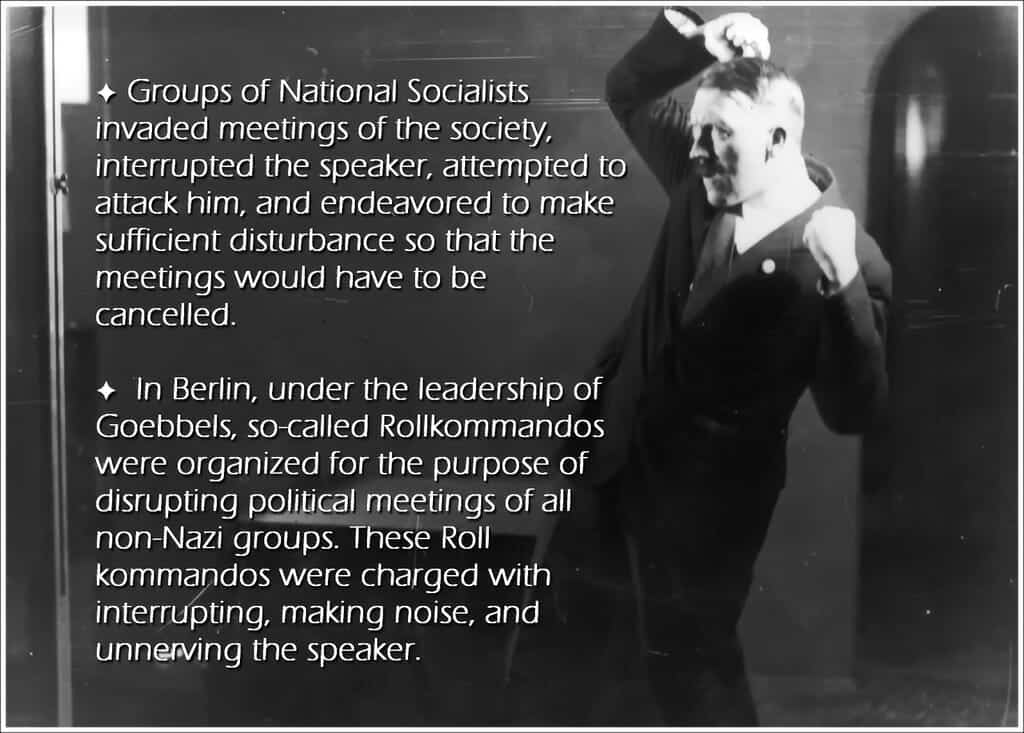
Since all the violent interruptions of speakers come from the left, essentially no conservative speaker would be allowed according to this policy. I noted this one of my posts many years ago in trying to define and describe Fascism:
- ….when people like Ann Coulter or David Horowitz go on campus, Democrat and leftist students ramp up the death threats and attempted takeover of the mic and stage. When people like Cindy Sheehan or Maureen Dowd go to a university campus, they are treated like heroes and no personal security is needed….
NEW YORK POST
The NEW YORK POST continues:
Aaron liked two Ohio-based anarchist groups — Burning River Anarchist Collective and Mutual Aid Street Solidarity — on his Facebook page.
He also gave the thumbs-up to an account belonging to the Kent State University chapter of the radical pro-Hamas group Students for Justice in Palestine.
In late December, Burning River touted two books for readers, including one titled, “Nourishing Resistance,’’ on its Facebook page.
On Oct. 17, 10 days after the Palestinian terror group Hamas launched its massacre in Israel, sparking the Gaza war, the anarchist group also linked to an interview by the Black Rose Anarchist Federation titled, “Voices from the Front Line Against the Occupation: Interview with Palestinian Anarchists.’’
It interviewed Fauda, “a small group centered in the West Bank that identifies itself as a Palestinian anarchist organization, to get their perspective on the current struggle.
“We hope that this interview will be a step in creating more connections between revolutionaries in the US and the militant youth in Palestine, and more knowledge and understanding of each other,’’ Black Rose said.
The Fauda member interviewed said during the conversation, “I want to tell all our brothers around the world, not just in the United States, to never trust what the global media empire tells you.
“I want you to know something else, which is that the Palestinian Authority and President Mahmoud Abbas do not represent us, the Palestinian people, at all. We reject authority and we reject Abbas and all his ministers.”
Burning River declined comment to The Post on Monday, saying in an email that “none of us knew’’ Aaron Bushnell.
[….]
Two people who claimed to be friends of Bushnell spoke to independent journalist Talia Jane, who posted their words to X on Monday.
“He is one of the most principled comrades I’ve ever known,” said a person called Xylem, who apparently had worked with Bushnell to support San Antonio’s unhoused residents.
Another friend called Errico, who said they had met Bushnell in 2022, added, “Aaron is the kindest, gentlest, silliest little kid in the Air Force.
“He’s always trying to think about how we can actually achieve liberation for all with a smile on his face.’’
Anarcho-Left Fascism
In fact… the entire “facade” of this conflict has it’s origins in communist propaganda and antisemitism. Of course whenever you see “anarchist,” especially in Western youth, know that is is collectivism of a communist type. Dennis Prager even mused on this years ago: “This is a recovered audio from my old Vimeo from April 2nd, 2011. It is Dennis Prager discussing how what the Left thinks is anarchy is nothing close to it.”
Which leads us to the most recent example of the state of our cultural decline, quoting Weaver from above:
- It is easy to be blind to the significance of a change because it is remote in time and abstract in character. Those who have not discovered that world view is the most important thing about a man, as about the men composing a culture, should consider the train of circumstances which have with perfect logic proceeded from this.
Drowning In Lies
- The thief comes only to steal, slaughter, and destroy. (John 10:10a, ISV)
- Be clear-minded and alert. Your opponent, the Devil, is prowling around like a roaring lion, looking for someone to devour. (1 Peter 5:8, ISV)
I noted to my boys the following regarding the topic MOONBATTERY will be bringing up (Air Force Member Aaron Bushnell’s self-immolation/suicide outside the Israeli embassy):
- The one positive that I can pull out of that whole Air Force kid is that at least he hurt himself. It’s tragic. I wish someone could have been able to talk him out of it. But, hurting himself versus hurting fellow service members to make a statement… I’m going with the the former.
My oldest responded in part: “I agree… I just am mad that the propaganda got to him. He fed on lies.” Yep.
To another friend I said something similar: “I wish someone was able to intervene in some way through conversation to get a ‘break through’.” To which he responded with a point I thought was sound, and a commentary that matches Weaver’s in some fashion:
- …your empathy is admirable. However, I’m confident it would have taken a lot more than conversation to persuade that guy. I don’t mean to go full armchair psychologists, but doing something like that suggests a fair degree of sociopathy as well as narcissistic delusion. — J.N.
Weaver notes on pages 53-54 this:
Obsession, according to the canons of psychology, occurs when an innocuous idea is substituted for a painful one. The victim simply avoids recognizing the thing which will hurt. We have seen that the most painful confession for the modern egotist to make is that there is a center of responsibility. He has escaped it by taking his direction with reference to the smallest points.
In one post I explain that much of the distorted view within the black community that harms it, and often leads to violence, is narcissism. So thinking through this this morning, I would add that this kid had the propensity to harm others as part of his statement based in lies and his egoism.
ON THE SIDE OF ANGELS
CUE MAMET:
One might say that the politician, the doctor, and the dramatist make their living from human misery; the doctor in attempting to alleviate it, the politician to capitalize on it, and the dramatist, to describe it.
But perhaps that is too epigrammatic.
When I was young, there was a period in American drama in which the writers strove to free themselves of the question of character.
Protagonists of their worthy plays had made no choices, but were afflicted by a condition not of their making; and this condition, homosexuality, illness, being a woman, etc., was the center of the play. As these protagonists had made no choices, they were in a state of innocence. They had not acted, so they could not have sinned.
A play is basically an exercise in the raising, lowering, and altering of expectations (such known, collectively, as the Plot); but these plays dealt not with expectations (how could they, for the state of the protagonist was not going to change?) but with sympathy.
What these audiences were witnessing was not a drama, but a troublesome human condition displayed as an attraction. This was, formerly, known as a freak show.
The subjects of these dramas were bearing burdens not of their choosing, as do we all. But misfortune, in life, we know, deserves forbearance on the part of the unafflicted. For though the display of courage in the face of adversity is worthy of all respect, the display of that respect by the unaffected is presumptuous and patronizing.
One does not gain merit from congratulating an afflicted person for his courage. One only gains entertainment.
Further, endorsement of the courage of the affliction play’s hero was not merely impertinent, but, more basically, spurious, as applause was vouchsafed not to a worthy stoic, but to an actor portraying him.
These plays were an (unfortunate) by-product of the contemporary love-of-the-victim. For a victim, as above, is pure, and cannot have sinned; and one, by endorsing him, may perhaps gain, by magic, part of his incontrovertible status.
David Mamet, The Secret Knowledge: On the Dismantling of American Culture (New York, NY: Sentinel Publishing, 2011), 134-135.
Or, as one truth loving leftist professor explains the modern day classroom narcissism of his students, “we [leftists] are on the side of angels”:
TRANSCRIPT: Having a sort of one party state in the classroom is that it leads to certain kinds of intellectual laziness. People can be gestural, and they can make gestures. Everyone in the [class]room knows we’re on the side of the angels, so the gestures don’t get criticized, but you step outside of that room, and certain gestural leftism’s will be criticized, and you really need to know how to deal with them.
MOOONBATTERY
FINALLY, here is the post via MOONBATTERY , in full!
Twisted recruitment emphasis and indoctrination in leftist ideology may be having the effect you might expect on the US military:
US Air Force member Aaron Bushnell has died from his injuries after setting himself on fire outside the Israeli Embassy in Washington, DC, an official confirmed on Monday.
Bushnell offered himself up as a human sacrifice on behalf of Hamas in the aftermath of the October 7 terror atrocities.
“I will no longer be complicit in genocide [in Gaza]. I am about to engage in an extreme act of protest,” Bushnell reportedly said, before setting himself ablaze and repeatedly crying out “Free Palestine.”
He died of moonbattery, in which he had been steeped:
“Many of us like to ask ourselves, ‘What would I do if I was alive during slavery? Or the Jim Crow South? Or apartheid? What would I do if my country was committing genocide?’ The answer is, you’re doing it. Right now,” he wrote.
Let’s be thankful Bushnell was not a pilot carrying a nuclear payload. He might have decided to confront white privilege by dropping it on a US city deemed to be insufficiently diverse.
Upon taking power, moonbat apparatchik Lloyd Austin conducted an ideological purge throughout the military. Too bad its purpose was not to root out kooks like Bushnell.
Aaron Bushnell personifies the figurative self-immolation by moonbattery of Western Civilization. Its age-old nemesis Islam is delighted.
UPDATE!
THIS IS the article I knew would come, and I was waiting for. You don’t set yourself on fire in a vacuum (ideological [or literally]). You need the wind of lies in your sails to propel you to that act. As one of my boys said, “traitor thru and thru!” The beginning part is a of course they did! See my old post on Roger Waters. As well as a Cornel West post just updated:
When Aaron Bushnell, an Antifa member and Air Force Airman, set himself on fire in front of the Israeli embassy in Washington D.C., Hamas supporters in this country made him into a martyr.
Cornel West praised Bushnell’s “extraordinary courage and commitment”, Roger Waters celebrated him as an “All-American Hero” and the media emphasized his military role.
In reality, Aaron Bushnell was a member of radical anarchist groups on social media, he wanted to leave the Air Force and cheered the killings of members of the U.S. military.
When three black Army soldiers were murdered in an Iranian-backed Islamic terror attack back in January, Aaron Bushnell posted it to the Antifa ACAB (All Cops are Bastards) Reddit group with a mocking “OhNoAnyway.jpg” meme.
“The cops are the domestic military and the military is the international police. They are bad for the exact same reasons,” Aaron Bushnell posted in the ensuing debate.
Bushnell believed that Islamic terrorists killing U.S. military personnel was justified, arguing that, “I work for the air force and would also have no right to complain about violent resistance against my actions.”
In a previous exchange he warned another user against joining the military and argued again that the murder of Americans was justified. “The US DoD is one of the most powerfully evil institutions to ever disgrace the face of this planet. You will have blood on your hands that you will never be able to wash off. There are many people who suffer under the imperial boot who would have every reason to wish you dead, and they would be justified. Don’t do it.”
When asked by another anarchist as to whether joining the military would provide him with the skills to conduct domestic terrorism, Bushnell appeared skeptical. “
It’s very unlikely that you get any kind of ‘proper training’ that would be useful in a revolutionary context,” he suggested. The military was “a neo-feudal institution plugged into the broader neoliberal system. It runs on nothing but coercion, toxic masculinity, and brainwashing.”
Aaron Bushnell’s comments reveal that he wanted out of the Air Force and believed it was evil.
“I joined thinking I was doing my part to make the world a better place. Then I realized we’re the baddies, and the only way to make the world a better place is to get out,”
Bushnell, who died in support of the Hamas war against Israel, not only supported the Islamic terror group, but also justified the destruction of Israel and the murder of Jews.
“Israel is a white supremacist, ethnonationalist, settler-colonial apartheid state….It has no right to exist,” Bushnell argued. He claimed that all the Jews could be killed because “there are no Israeli ‘civilians’” and that Israel was “the closest thing the world has to the Nazis”. Exterminating Israelis “wouldn’t be genocidal but actually perfectly reasonable, as Israelis are settler-colonizers” and described Hamas as an “anti-colonial resistance organization”.
“Israel’s existence can’t be justified in the first place, it’s a colony of the US and UK. It has imposed apartheid, displacement, and extermination on the Palestinian people since its inception. No aggression against the Israeli colony can be condemned by non-Palestinians.”
The murdered Israeli families in nearby towns had it coming because they were “colonizers” and “I don’t get to claim it’s a violation of my human rights if some of those people come and kick me back out of that house or throw a molotov at it or kidnap me.”
Aaron Bushnell compared Hamas to the “diverse coalition in Star Wars” and dismissed people “clutching their pearls over” the killing and rape of young Israelis at the Nova music festival because there “are no innocent civilians in seller colonialism”.
“That music festival was happening just three miles from Gaza,” Bushnell contended. “Imagine a similar event happening in the early days of the colonization of North America. Can you or I really say that Indigenous people are wrong for retaliating against colonizers who are rubbing their domination in their face?”
Aaron Bushnell believed that the destruction of America was as justified as that of Israel.
[….]
His death will be used by Islamic terrorists and Antifa to recruit more young men like him.
The Bushnell case is a wake-up call about actual extremism within the military. Someone recruited him and someone encouraged him to kill himself. National security begins with finding and exposing the Islamic terrorists and extremists inside the United States Air Force.

